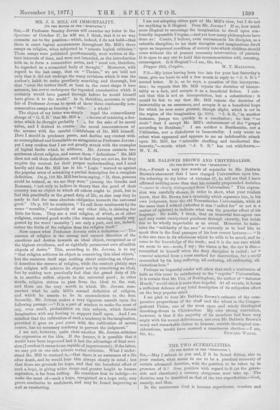MR. BALDWIN BROWN AND UNIVERSALISM.
[TO TIM EDITOR OF TRH " BrIDDTATOR."]
SIII,—Permit a very few words of rejoinder to Mr. Baldwin Brown's statement that I have charged Universalism upon him. On referring to my letter of October 27, he will see that I have affirmed nothing more than that his recently propounded doctrine "cannot be clearly distinguished from Universalism." This expres- sion was carefully chosen, in order to show, what your readers know, that Mr. Brown has a speciality which separates him, in his own judgment, from the old Necessitarian Universalists, while at the same time I wished (whether it was " called for" or not is a matter of opinion) to indicate what was the popular effect of his language. He holds, I think, that an immortal free-agent can and may resist omnipotent goodness through eternity, but holds this to be wholly improbable as an event. Moreover, he main- tains the "solidarity of the race" so earnestly as to lead him to speak thus in the final passages of his four recent lectures:— 44 It is the one race in its wholeness which he wills to be saved, and to come to the knowledge of the truth ; and it is the one race which we seem to see—seem, I say ; the vision is far, the eye is dim— reconciled to himself when the fiery discipline is ended ; not a remnant selected from a mass marked for destruction, but a world reconciled by his long suffering, rdl-enduring, all-embracing, all- victorious love."
Perhaps an impartial reader will allow that such a confession of faith as this must be satisfactory to the "regular" Universalists. It is certain that Mr. Cox, of Nottingham, the author of " Salvator Mundi," would think it more than hopeful. At all events, it forms a sufficient defence of my brief description of its subjective effect on the hazy popular mind.
I am glad to hear Mr. Baldwin Brown's estimate of the com- parative proportions of the chaff and the wheat in the Congre- gational Union, one of the most open and windy theological threshing-floors in Christendom. My own strong conviction, however, is that if the majority of its members had been very angry with his recent deliverances, not even Mr. Baldwin Brown's many and remarkable claims to honour, outside theological con- siderations, would have ensured a unanimousevlecntDiolHI eiTI "TRITE.






































 Previous page
Previous page